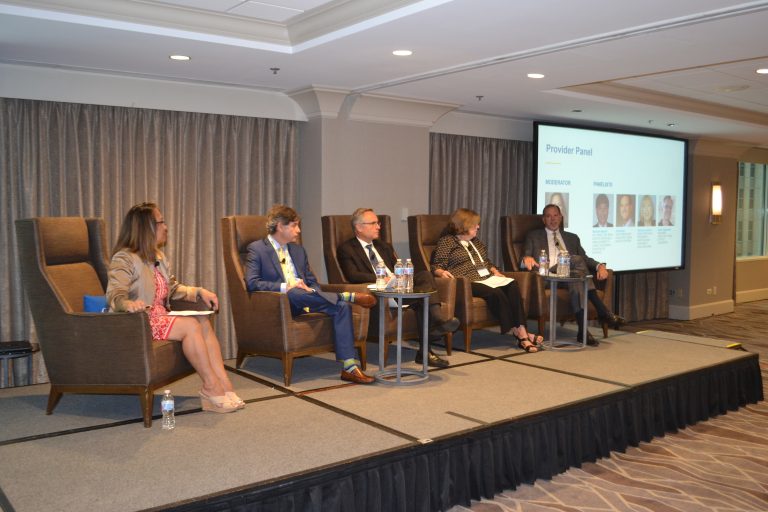Panelists at Colliers Healthcare conference outline what they want from HRE firms
 CHICAGO — When health system executives talk, healthcare real estate (HRE) professionals typically sit up and listen. After all, the needs of the country’s hospitals and health systems are what continue to drive HRE facility development, acquisitions, property management and other services such firms hope to provide.
CHICAGO — When health system executives talk, healthcare real estate (HRE) professionals typically sit up and listen. After all, the needs of the country’s hospitals and health systems are what continue to drive HRE facility development, acquisitions, property management and other services such firms hope to provide.
During last week’s two-day, 2019 Colliers National Healthcare Conference in Chicago, HRE professionals certainly paid close attenation as a panel of Chicago-area health system executives discussed a number of topics ranging from the ongoing effects of the Patient Protection and Affordable Care Act (PPACA), the always robust mergers and acquistions (M&A) market among health systems and physician groups, and a number of other topics.
Perhaps most intriguing to the HRE professionals in attendance was a portion of the session in which the executives talked about what services, expertise and perhaps advice they would like to receive from HRE firms looking to work with them.
Sharon Carter, managing director with Chicago-based consulting firm Ankura, which does plenty of work with healthcare systems and clients, asked the panelists: “In areas that are less familiar markets to you, what parameters are you needing from your developers, your property managers and possibly even hospital operators, from the partners that you have here … what talents and expertise do you want them to have in order for you to work with them?”
As expected, the executives, for the most part, noted that they do not want to work with HRE firms and developers that simply want to build them a building, or perhaps sell buildings for them, at the biggest profits for themselves.
“There’s a thousand times a thousand developers out there (have told us) that they will build you a box…,” said Mark Yagerlener, regional director – real estate with St. Louis-based Ascension. “That’s not what we’re looking for… We’re looking for a developer who really understands how to plan that building for current and future growth. One of the developers I worked with … were actually very instrumental in helping us reduce the size of the building from the original scope. That’s the sort of developer we’re looking for, someone we can partner with them. We’re great at delivering healthcare. We’re not great at building our own outpatient facilities.”
Michael Becker, senior director of real estate services with the Ann & Robert H. Lurie Children’s Hospital of Chicago, added that the system looks to work with firms with plenty of medical office building (MOB) development experience and who can deliver projects with great “speed to market.”
When it comes to leasing space out in the market, the Children’s Hospital wants “lease flexibility, we want structure flexibility, we want building flexibility, and we want to be able to dial up and dial down,” Mr. Becker said. “We want the world. And the world is challenging to deliver, but that’s essentially what we’re looking for.
“We want flexibility in moving one specialty in and one specialty out and another specialty in,” he added. “We want someone who really understands the business and we want it at a great price. So you know, we also want you to deliver lunch.”
“There really an entrepreneurial opportunity there for developers to help us get to the market as quickly as possible,” he concluded.
Jim Bicak, VP of facilities with Sinai Health System, which has several hospitals and numerous clinic locations in Greater Chicago, said he would like to work with HRE firms that have a strong knowledge of the system’s operations.
“I’d like to (have a firm help) us understand, before we get to the point of building, how we can be more efficient with what we’re doing,” Mr. Bicak said. Two years ago, he noted, the system did an analysis of all of its off-site clinical locations, concluding that while a number of them in the right locations, others were not.
“So we started to divest ourselves of those, and really pared back,” Mr. Bicak said. “As part of that we started to question what we really need to own as the community started to change in our area…”
“Our bigger question is, ‘Do we need to actually own facilities or should we be looking at long-term leases?’” he asked. “’What is an efficient operation? So we can really use help with the whole data analytics that helps us know what the solution is for us.”
Patricia Leonard, executive VP with Evanston, Ill.-based NorthShore University HealthSystem, told the audience that the system worked with an HRE firm in looking at its current facilities in order to help it determine “how efficient were we, how cost effective were we? Were there any cost savings in what we currently have?”
“So we evaluated all of our practices based on space … leasing, timing, things like that,” she said. “And it was very helpful. We saved quite a bit of money looking at that analysis and really evaluating what we currently have.”
As part of NorthShore’s strategy to attract millennials as patients, the system started adding “immediate care” facilities in surrounding communities.
“We know that millennials want transactional care, right?” she said. “They don’t want a relationship with (a doctor) at this point. So, based on that, we started looking an immediate care strategy. And it’s not a secret, as we’ve opened up about 12 immediate care centers this fiscal year and are looking at different locations based on the market, square footage of the space, making sure that we do not have more than 2,500 to 3,000 square feet of space and have locations in the geographies we wanted.“
“There was so much that went into it, but we really had a very partnership relationship in that endeavor,” Ms. Leonard added.
The Colliers National Healthcare Conference, held Sept. 12-13 at the Hyatt Centric Chicago Magnificent Mile, included a number of panel sessions and presentations about real estate, MOB development, health system strategies, potential disruptors to the current care model, and other topics.
Watch for more coverage of the conference in upcoming editions of HREI.
The full content of this article is only available to paid subscribers. If you are an active subscriber, please log in. To subscribe, please click here: SUBSCRIBE






